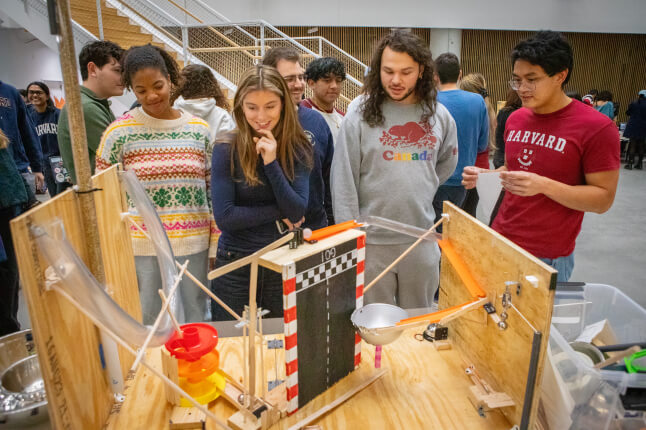News

The five winners of the 2025 Quantum Shorts competition, along with quantum science and engineering student Yi Zhu and Lizette Ortega, Senior Program Administrator for Student Development at SEAS (Matt Goisman/SEAS)
Peggy Chen didn’t know too much about quantum science and engineering before this summer. To Chen, a recent graduate of Green Hope High School in North Carolina, quantum science was a topic discussed by “really smart people like Einstein, working on a chalkboard,” and not something accessible to a general audience.
“One of my physics teachers would always say that the rules in quantum are super weird,” said Chen. “I wanted to figure out what that meant. I didn’t come from a super deep math or science background, but being able to learn more about quantum interested me.”
To learn about quantum, Chen was one of approximately 70 students ages 14-19 who participated in the 2025 Quantum Shorts competition. Sponsored by the Harvard Quantum Initiative in Science and Engineering (HQI), which is co-run by Harvard John A. Paulson School of Engineering and Applied Sciences (SEAS) faculty Evelyn Hu, as well as the International Year of Quantum Science and Technology, the competition tasked students with submitting 90-second videos on a topic of their choice within the general realm of quantum science and engineering. Chen was one of five winners, all of whom were brought to SEAS for a two-day trip that included a virtual open house, lab tours, career panels and a visit to the Museum of Science in Boston.
“This trip definitely redefined what I thought about physics,” Chen said. “Before, I was considering studying astrophysics or a more theoretical track. But here I’ve seen a lot of labs that work with applied physics, mechanical engineering and electrical engineering. This trip showed me that engineering is very intersectional, and it really made me more interested in engineering physics.”
A part of her high school’s journalism program, Chen simulated a news broadcast for her contest submission. It delved into Bose-Einstein Condensates, a state of matter formed at temperatures extremely close to absolute zero.
Like Chen, Azalea Li also entered the competition with little background in quantum science and engineering. A 14-year-old at Hunter College High School in New York, Li submitted a stop-motion animated video about quantum cryptography, which could be essential to the future of cybersecurity.
“Diving into something new was one of the main reasons I applied, because I wanted to learn more,” Li said. “Class work is usually writing essays, or doing research and answering questions. With this, I got to almost teach a topic, which helped me learn it better.”
Now in its second year, Quantum Shorts is the brainchild of Lizette Ortega, Senior Program Administrator for Student Development at SEAS, and Yi Zhu, a Ph.D. student in quantum science and engineering in the lab of Giulia Semghini, Assistant Professor of Applied Physics. Inspired by his experiences as an undergraduate at the University of California-Berkeley, Zhu wanted to create a program that could broaden research and research-adjacent opportunities for younger students.
“There are a lot of programs within Harvard focused on the local community, and these programs are obviously amazing,” he said. “But what I found was kind of lacking was being able to reach out to a wider audience within the United States and also internationally. The contest is about quantum science, but I think more broadly it's about science in general. There are many people that maybe don't know that they want to do science, and so the opportunity to show them this early on is I think very important.”
This isn’t the only high school outreach program sponsored by HQI. QuERY (“Quantum Engineering Research and You”), started in 2022, is a program that pairs students from Bellaire High School in Houston with graduate students to introduce topics in quantum science and engineering. One of those high school students was Kaylani Gifford, who’d go on to be a 2025 Quantum Shorts winner with her video on band structures and material properties. Her video explored how electron movement in different materials affects whether they behave as an insulator or conductor.
“This has definitely been a lovely experience,” said Gifford. “Through the programs that the Harvard Quantum Initiative has done, I’ve definitely become a lot more interested in quantum science. This has definitely locked in my desire to do something involving quantum science when I grow up.”
Approximately half of the Quantum Shorts submissions came from outside the U.S., a point of pride for Zhu. The lone international winner was Australian 19-year-old James Li, an electrical engineering and computer science student at the University of New South Wales in Sydney. Li’s video explored spin-½, a fundamental propert of elementary particles.
“Quantum physics piqued my interest because it’s so unintuitive,” he said. “Classical physics is really intuitive. You can see it in action. Quantum physics is the opposite. You can’t really see the properties, so it’s almost like guesswork.”
Grey Ardon-Lindquist from Enloe High School in North Carolina was the fifth winner. Ardon-Lindquist’s video explored scanning tunneling microscopes and a phenomenon known as quantum tunneling, in which electrons pass through an energy barrier in waves.
“Everything behaves weirdly and differently at a quantum scale, which I thought was really interesting and cool,” Ardon-Lindquist said. “I’ve made some videos for class projects, but because this one is only 90 seconds, it’s really challenging to present something this complicated in such a short time. I didn’t use any mathematical formulas, and used more general terms to make it more understandable.”
Topics: Academics, Quantum Engineering
Cutting-edge science delivered direct to your inbox.
Join the Harvard SEAS mailing list.
Press Contact
Matt Goisman | mgoisman@g.harvard.edu


